Sociocultural Aspects of Development
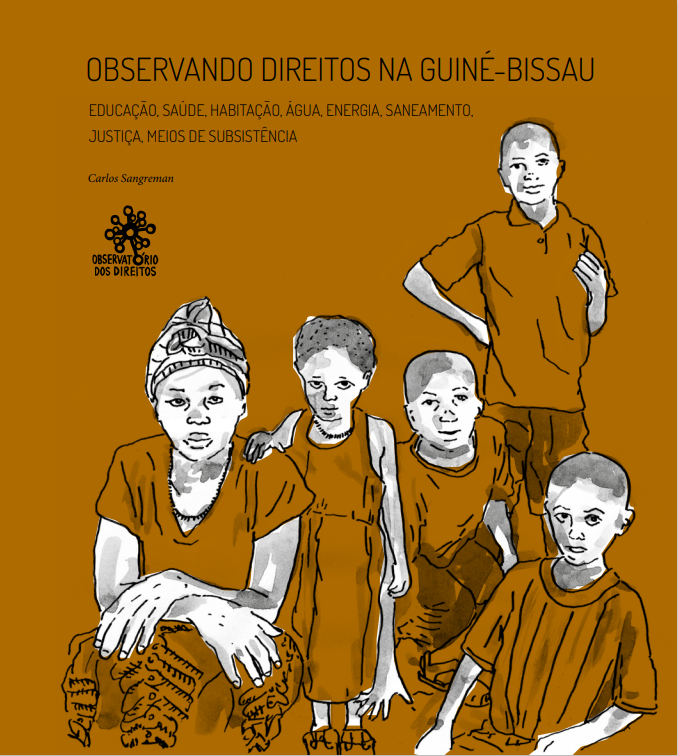
Observando Direitos na Guiné-Bissau: Educação, saúde, habitação, água, energia, saneamento, justiça, meios de subsistência
Quotation:
Sangreman, C. (2017). Observando Direitos na Guiné-Bissau – educação, saúde, habitação, água, energia, saneamento, justiça, meios de subsistência. Lisboa: ACEP, com LGDH e CEsA. ISBN 978-989-8625-16-8

Observando Direitos na Guiné-Bissau: Educação, saúde, habitação, água, energia, saneamento, justiça, meios de subsistência
Quotation:
Sangreman, C. (2016). Observando Direitos na Guiné-Bissau – educação, saúde, habitação, água, energia, saneamento, justiça, meios de subsistência. Lisboa: ACEP, com LGDH e CEsA. ISBN 978-989-8625-14-4
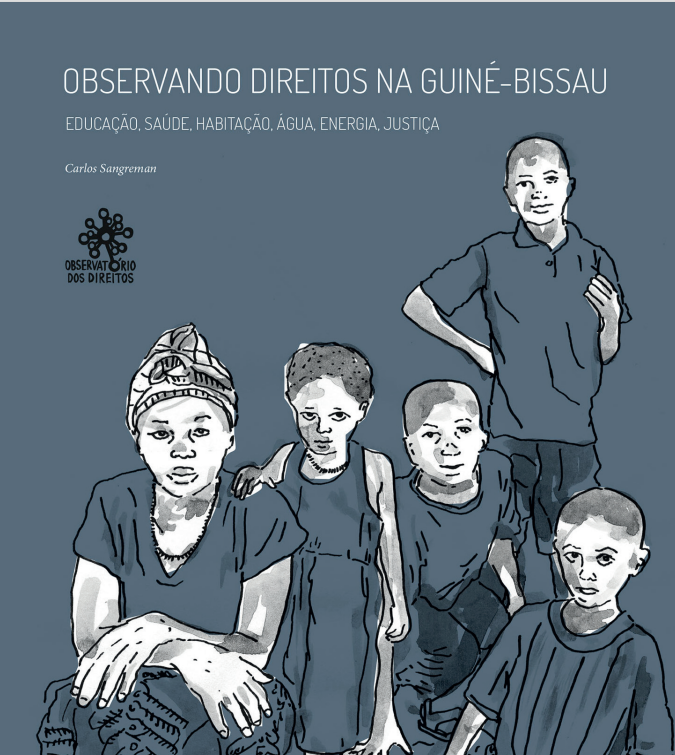
Observando Direitos na Guiné-Bissau: Educação, saúde, habitação, água, energia, justiça
Quotation:
Sangreman, C. (2015). Observando Direitos na Guiné-Bissau – educação, saúde, habitação, água, energia, justiça. Lisboa: ACEP, com LGDH e CEsA. ISBN 978-989-8625-07-6.
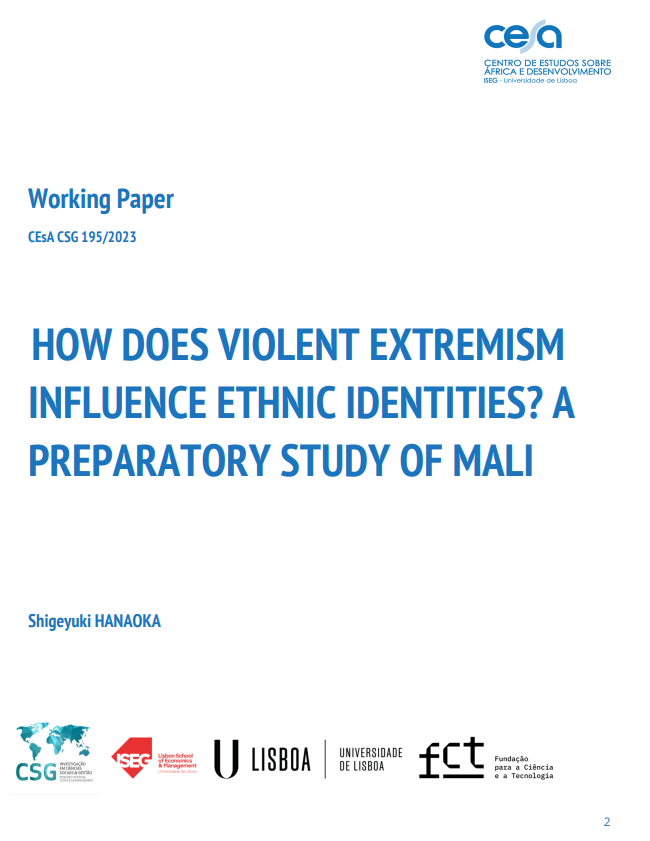
Working Paper 195/2023: How Does Violent Extremism Influence Ethnic Identities? A Preparatory Study Of Mali
Abstract:
How does violent extremism (VE) impact individuals’ ethnic identities? While there is a broad body of research on VE, which has seen significant growth in Africa in recent years, including assessments of its origins, the coalescence of various movements, and military operations against VE, research on its impact on ethnic identity and its associated political behaviours remains limited. This work serves as a preparatory study to examine how people’s perceptions, and political behaviours related to ethnic identity have evolved during the period of VE’s substantial expansion in Mali in recent years.
Quotation:
Hanaoka, Shigeyuki (2023). “How Does Violent Extremism Influence Ethnic Identities? A Preparatory Study Of Mali”. CEsA/CGS – Documentos de trabalho nº 195/2023
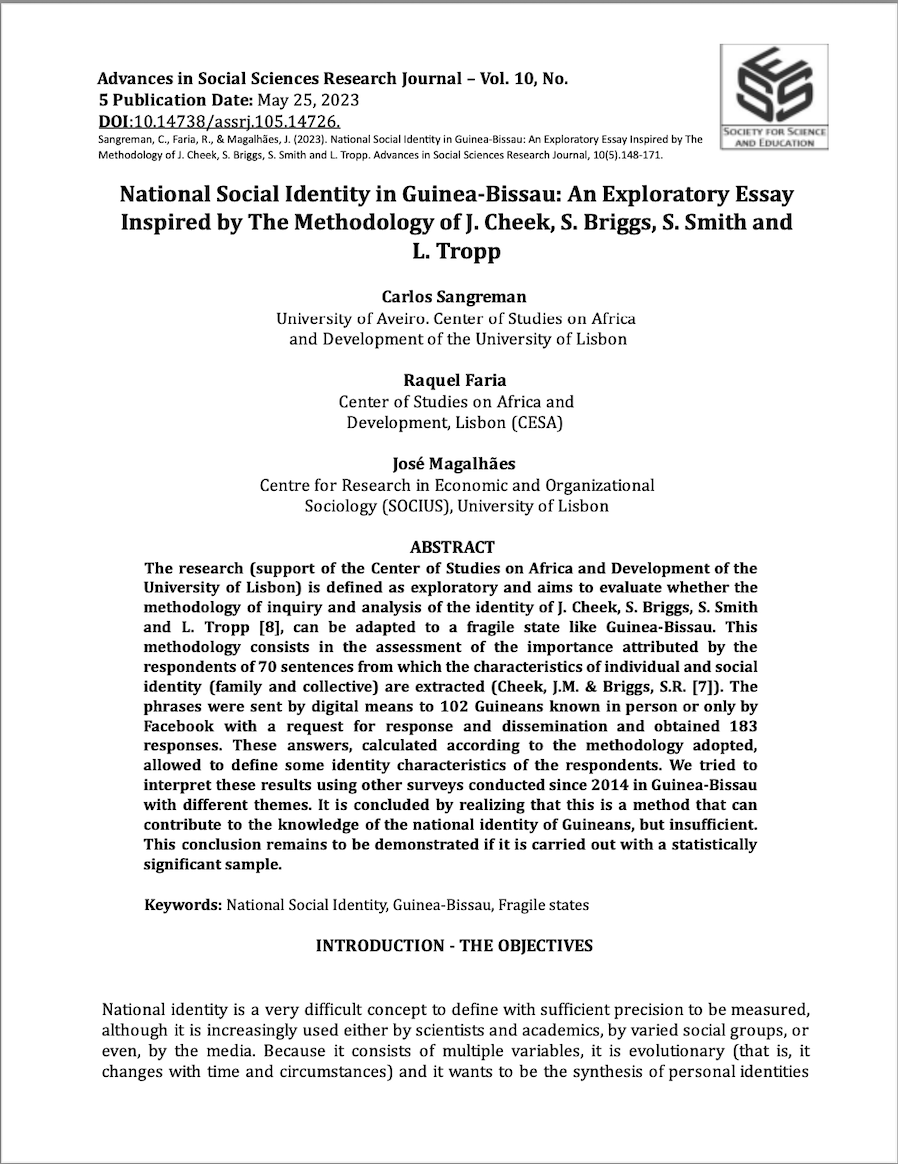
National Social Identity in Guinea-Bissau: An Exploratory Essay Inspired by the Methodology of J. Cheek, S. Briggs, S. Smith and L. Tropp
Abstract:
The research (supported by the Centre for African and Development Studies of the University of Lisbon) is defined as exploratory and aims to evaluate whether the methodology of inquiry and analysis of the identity of J. Cheek, S. Briggs, S. Smith and L. Tropp, can be adapted to a fragile state like Guinea-Bissau. This methodology consists in the assessment of the importance attributed by the respondents of 70 sentences from which the characteristics of individual and social identity (family and collective) are extracted (Cheek, J. M. & Briggs, S. R.). The phrases were sent by digital means to 102 Guineans known in person or only by Facebook with a request for response and dissemination and obtained 183 responses. These answers, calculated according to the methodology adopted, allowed to define some identity characteristics of the respondents. We tried to interpret these results using other surveys conducted since 2014 in Guinea-Bissau with different themes. It is concluded by realizing that this is a method that can contribute to the knowledge of the national identity of Guineans, but insufficient. This conclusion remains to be demonstrated if it is carried out with a statistically significant sample.
Quotation:
Sangreman, C., Faria, R., & Magalhães, J. (2023). National Social Identity in Guinea-Bissau: An exploratory essay inspired by the methodology of J. Cheek, S. Smith and L. Tropp. Advances in Social Sciences Research Journal, 10(5).148-171.
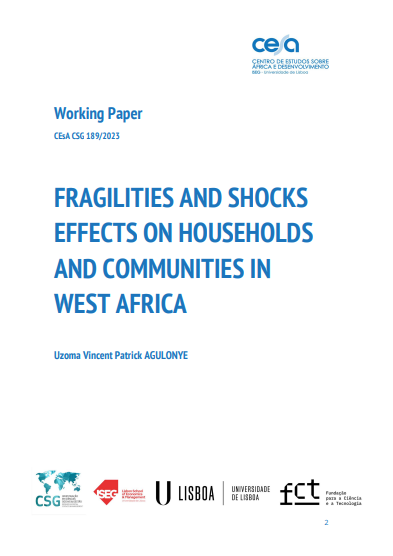
Working Paper 189/2023: Fragilities and shocks effects on households and communities in West Africa
Abstract:
Shocks are drivers of fragility yet most works on fragility in Africa use the tag “fragile state(s)” with less focus on the drivers of fragility in its institutions, states, and economies. Shocks are cardinal to the entrenchment or stability of any system. The Covid-19 pandemic revealed how fragile the world is including the “developed” or “advanced” systems. Today, households, businesses, and communities in most parts of Sub-Saharan Africa suffer the effects of a triple whammy (climate change, the pandemic and Russia/Ukraine War) including effects of history and an unfavourable global system all of which leaves them in hunger, poverty and vulnerable conditions. Fragilities and Shocks Effects on Households and Communities in West Africa used secondary sources to revisit the effects of these shocks on households, and communities in West Africa through the lens of common resources. The recent shocks effects prevalent in all these countries is higher than reported and would affect West Africa´s growing population in the foreseeable future with the absence of safety nets or effective interventions. The absence of shocks preparation in the subregion is not sustainable and adds up to the sustenance of the revolving circle of fragility in the subregion.
Quotation:
Agulonye, U.V.P. 2023. “Fragilities and Shocks Effects on Households and Communities in West Africa“. Instituto Superior de Economia e Gestão – CEsA/CSG – Documentos de Trabalho nº 189/2023
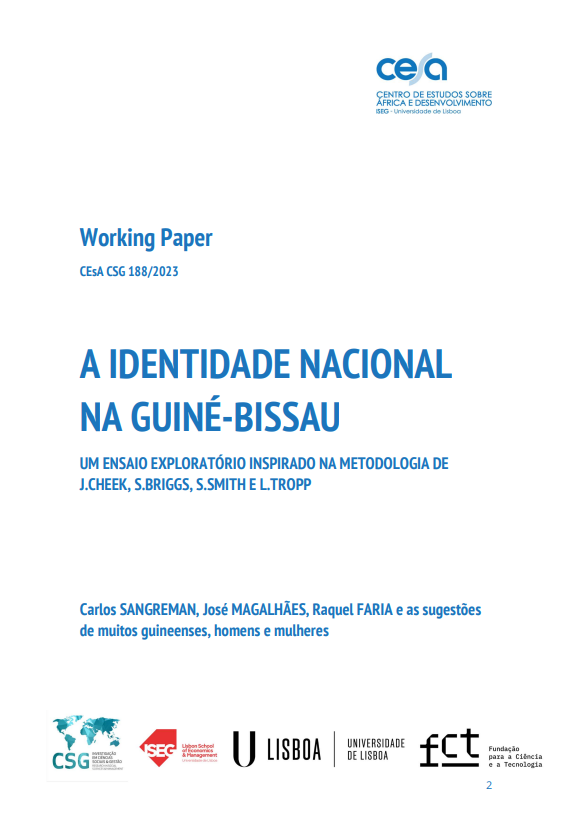
Working Paper 188/2023: A identidade nacional na Guiné-Bissau: um ensaio exploratório inspirado na metodologia de J.Cheek, S.Briggs, S.Smith e L.Tropp
Abstract:
The investigation of A Identidade Nacional na Guiné-Bissau – Um ensaio exploratório inspirado na metodologia de J.Cheek, S.Briggs, S.Smith e L.Tropp is defined as exploratory and aims to evaluate whether the methodology of inquiry and analysis of identity. created by J. Cheek, S. Briggs, S. Smith and L. Tropp, can be adapted to a fragile state like Guinea-Bissau. This methodology consists in the assessment of the importance attributed by the respondents of 70 sentences from which the characteristics of individual and social identity (family and collective) are extracted. The sentences were sent by digital means to 102 Guineans known in person or only by Facebook with request for response and dissemination and obtained 183 responses. These answers, calculated according to the methodology adopted, allowed to define some identity characteristics of the respondents. We tried to interpret these results using other surveys made since 2014 in Guinea-Bissau with different themes. It is concluded by realizing that this is a method that can contribute to the knowledge of the national identity of Guineans, but insufficient. This conclusion remains to be demonstrated if it is carried out with a statistically significant sample.
Quotation:
Sangreman, C., Magalhães, J., Faria, R. (2023). “A Identidade Nacional na Guiné-Bissau – Um ensaio exploratório inspirado na metodologia de J.Cheek, S.Briggs, S.Smith e L.Tropp“. Instituto Superior de Economia e Gestão – CEsA/CSG – Documentos de Trabalho nº 188/2023
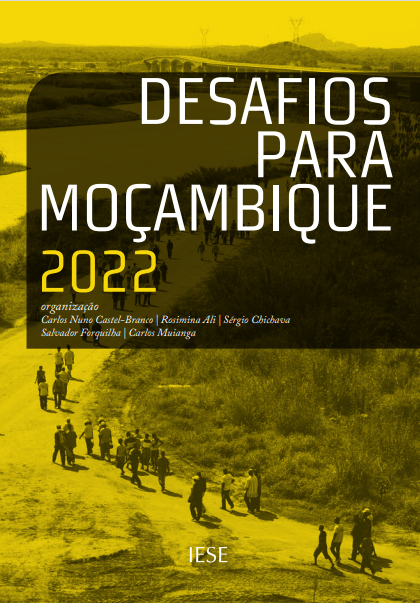
Desafios para Moçambique, 2022
Abstract:
This issue of Desafios para Moçambique (2022) comes as the country faces enormous challenges – the war in Cabo Delgado, with some signs of expansion into other provinces; the Rovuma basin gas extraction and liquefaction projects, which realise some 24 Challenges for Mozambique 2022 Introduction of the greatest challenges in Mozambique’s economic history; the lingering effects of the global crisis, the bursting and implosion of the economic bubble, of which the sovereign debt crisis was a manifestation, and the social and economic after-effects of the covid-19 pandemic. These challenges and crises stimulated research and resulted in lessons, some of which are developed in this issue. Recently ended in Maputo, the trial of some of the state agents and private agents involved in the illicit international financial transactions that resulted in the odious debts. What was already clear before – that these illicit transactions are a reflection of more general dynamics of expropriation, privatisation and financialisation of the state for private accumulation of capital, even if this is done at heavy social costs – has, if possible, become clearer. The hypothesis that the legal process, which we had the opportunity to follow for about a year and a half, only touched on the recipients of commissions for corruption and influence peddling, the executors of the great default against the public purse, was confirmed.
Quotation:
Castel-Branco, C.N., Ali, R., Chichava, S., Forquilha, S., Muianga, C. (2022) Desafios para Moçambique, 2022. IESE. Maputo, Moçambique. ISBN: 978-989-8464-58-3
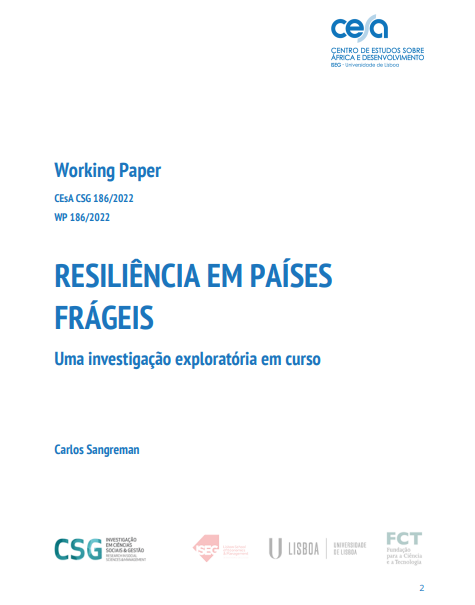
Working Paper 187/2022: Resiliência em Países Frágeis – uma investigação exploratória em curso
Abstract:
Resiliência em Países Frágeis – uma investigação exploratória em curso started in 2017 when the director of a service directorate of the Joint Research Center, at ECAS in Geneva, invited Prof. Carlos Sangreman to an exploratory study on resilience in Guinea-Bissau with the title Context specific risk perception and resilience patterns for individuals and communities (urban/non-urban) – the case of people in Guinea-Bissau. The study was carried out on the basis of the survey whose form is included in this Working Paper, gave rise to the attached article in an international journal and to a PhD thesis in progress at the University of Aveiro. The partnership between JRC and Cesa also involved Professor Alexandre Abreu and Master Jessica Santos, as well as Carlos Sangreman. From the JRC were Chistophe Quétel, Guy Bourdin and Ilektra Lemi. A survey was conducted in all regions and capital of the country to 210 households, with a previous pilot to 36 to refine the questionnaire in this partnership: project Enquêtes de terrain sur la perception du risque et la résilience des ménages en Guinée-Bissau Projet: Ares(2018)2381703 – 04/05/2018. Centre Commun de Recherche (JRC) de la Commission Européenne, Direction E, and CESA – Centre for Studies on Africa and Development of the University of Lisbon.
Quotation:
Sangreman, C., Martins, D., Quetel, C. Abreu, A. e Bourdin, G. (2022). “Resiliência em Países Frágeis – uma investigação exploratória em curso”. CEsA/CSG/ISEG/ULisboa – Documentos de Trabalho nº 186/2022
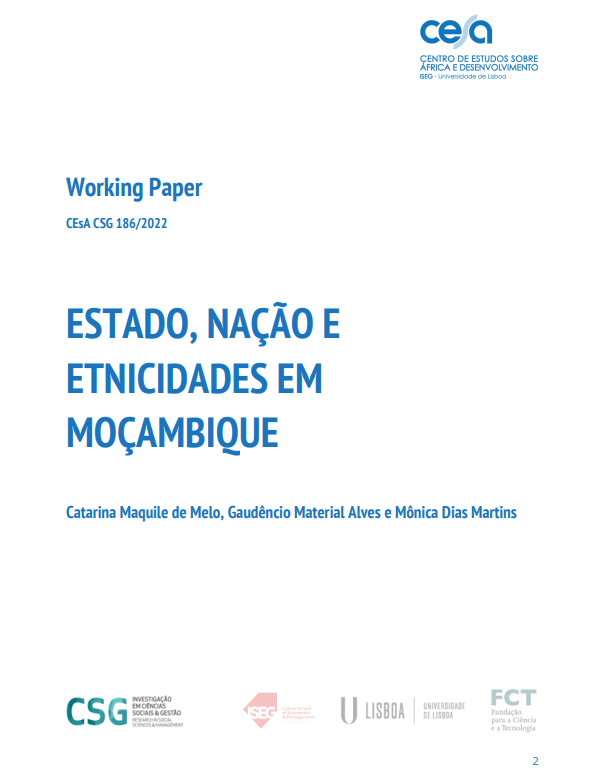
Working Paper 186/2022: Estado, Nação e Etnicidades em Moçambique
Abstract:
The processes of state and nation building begin soon after independence and establish a link between them, although each has its own logic. While the nation refers to collective identity, the State refers to the existence of a central-level political authority, respected throughout the territory. As evidenced during the text, a significant part of the State structure that emerged after national independence was the result of the Portuguese colonial legacy, idealized by FRELIMO’s ruling elite and implemented as a project of formation of the “New Man”, which occurred in an imperative way and through uniformizing policies. Estado, Nação e Etnicidades em Moçambique analyses the process of State and Nation building in Mozambique, whose population is characterised by a diversity of ethnicities. The first section presents a reflection on the foundations, the main actors and the actions towards the formation of the nation-state. In the second, we discuss the relationship between nationalism and socialist ideology, the latter interpreted in the post-independence period as the only path that would lead to development and to a society free from exploitation. With the 1990 constitution, a new order of political and economic liberalisation came into force. We seek to critically examine the political process underway in the country, in defiance of the dominant conceptions in the media, government, business and academic circles. To this end, we rely on bibliographic research and official documents, in addition to the experiences of two scholars who develop work in Quelimane, capital of Zambézia province in central Mozambique.
Quotation:
De Melo, C. M., Material Alves, G. e Martins, M. D. (2022). “Estado, Nação e Etnicidades em Moçambique”. CEsA/CSG/ISEG/ULisboa – Documentos de Trabalho nº 186/2022





